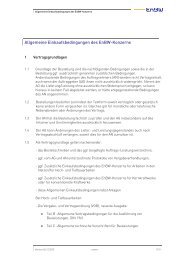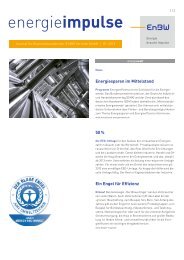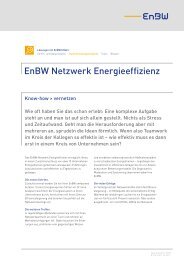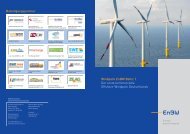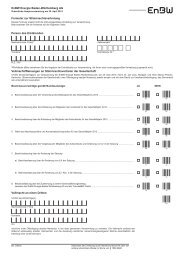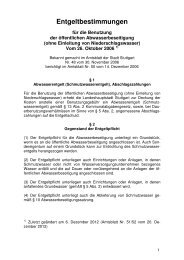2008 I 2009 Sustainability Report - Econsense
2008 I 2009 Sustainability Report - Econsense
2008 I 2009 Sustainability Report - Econsense
Create successful ePaper yourself
Turn your PDF publications into a flip-book with our unique Google optimized e-Paper software.
ing the various items in Germany's "integrated<br />
energy and climate programme". The<br />
binding climate protection target is minus<br />
30% compared to 1990 levels – or minus 40 %<br />
if the EU targets are upgraded. Germany's<br />
political decision-makers have long since<br />
agreed to aim for the higher target anyway,<br />
however, and have adopted a whole package<br />
of measures to meet this target. To date,<br />
Germany has succeeded in achieving a<br />
reduction of 18%.<br />
The amended EEG renewables legislation<br />
came into force in Germany at the beginning<br />
of <strong>2009</strong>. It confirms the priority feed of electricity<br />
from renewable sources into the network,<br />
and this electricity will continue to be<br />
financed by the network operators based on<br />
predefined remuneration rates varying<br />
according to size of facility and source of<br />
energy (wind, water, solar, geothermal or<br />
biomass). The remuneration rates are to be<br />
adjusted; the rates for offshore wind energy,<br />
for example, will be considerably higher in<br />
future in order to promote the construction<br />
of new installations at sea. The share of renewables<br />
in total German energy consumption<br />
is to be increased to 30% by the year<br />
2020 (compared to the current figure of<br />
15%). The amendment of the compensation<br />
mechanism for the added cost of renewables<br />
is extremely welcome. It has been greatly<br />
simplified – and this limits financial risks<br />
while reducing costs.<br />
As the expansion of the electricity networks<br />
has not matched the rapid pace of growth of<br />
renewable sources of energy, there is a growing<br />
risk of bottlenecks and instability. The<br />
German Electricity Grid Expansion Act is designed<br />
to address the potential problems in<br />
the transport networks.<br />
The share of electricity generated in highly<br />
efficient power plants – using heat-and-power<br />
cogeneration concepts – is also to increase.<br />
The amended German Cogeneration Act also<br />
came into force at the beginning of <strong>2009</strong>.<br />
Now, industrial cogeneration activities are<br />
being subsidised for the first time, even<br />
when no power is fed into the public net-<br />
work, as is the construction of heating networks.<br />
At the same time, however, annual<br />
support is still capped at 750 million €. The<br />
aim is to grow the share of electricity from<br />
combined heat-and-power plants to 25%<br />
by 2020. This would be double the current<br />
figure.<br />
The German Renewables Act stipulates a pro<br />
rata consumption of heating energy from<br />
renewable sources for new buildings. If the<br />
homeowner decides in favour of geothermal<br />
energy, environmental heating or biomass,<br />
these must account for at least half of all<br />
heating energy consumption. The minimum<br />
figure for solar heating is 15%. The German<br />
Energy Efficiency Ordinance governing maximum<br />
energy consumption in new buildings<br />
now also contains stricter provisions. Reduced<br />
energy consumption in old buildings<br />
is promoted by schemes like the "market incentive<br />
programme" or the "CO 2 building<br />
modernisation programme". The proceeds<br />
from emissions trading have been used to<br />
significantly up the overall funding volume.<br />
These measures are designed to reduce primary<br />
energy consumption in Germany by<br />
17% by 2020 compared to 1990 levels. In order<br />
to meet this target, primary energy productivity<br />
needs to be doubled – or, put another<br />
way – to improve by 3% a year. Between<br />
1990 and 2005, however, the increase was<br />
just 1.7%, despite the collapse of the inefficient<br />
structures in East Germany. The target<br />
is certainly ambitious; this also applies, if<br />
not even more so, to the secondary target –<br />
an 11% reduction in energy consumption, a<br />
variable that has increased modestly yet regularly,<br />
at least in the years prior to the onset<br />
of the economic crisis. While it is true that<br />
energy-consuming appliances are doubtless<br />
becoming more and more efficient, there are<br />
also significant countertrends: the increasing<br />
presence of computers and Internet connections<br />
in modern households, for example,<br />
the ever-increasing size of refrigerators<br />
and TV screens, and the growing spread of<br />
consumer electronics. Quite apart from this,<br />
electricity is also often used in the form of<br />
"efficient energy". Electrically driven thermal<br />
energy pumps help to save primary energy,<br />
for example. The same applies to the soonto-be-launched<br />
electromobiles in the transport<br />
sector. As a result, there are serious<br />
doubts as to whether we will be able to<br />
achieve the 11% target. Moreover, at the end<br />
of the last legislative term, political differences<br />
prevented the adoption of new energy<br />
efficiency legislation by the coalition<br />
government.<br />
There are also well-founded doubts regarding<br />
the targeted growth in the share of electricity<br />
generated in combined heat-andpower<br />
plants. If subsidies remain at the<br />
current level, it is unlikely that the target will<br />
be met. A further problem is the exceedingly<br />
slow pace at which existing buildings are being<br />
modernised. In contrast, the prospects<br />
for meeting the targets for electricity from<br />
renewables are favourable. The precondition<br />
for this, however, is that the construction of<br />
new wind energy installations at sea picks up<br />
pace following a delay of several years and<br />
that the industry succeeds in replacing old<br />
and small wind turbines with new, highpowered<br />
wind energy installations throughout<br />
Germany.<br />
All in all, the measures planned to date will<br />
not be sufficient to meet the 40% target laid<br />
down by the German government. This is<br />
the conclusion reached by nearly all the<br />
studies conducted to date. The German Environment<br />
Agency recently predicted a reduction<br />
in greenhouse gas emissions of 35% at<br />
most. A study conducted by the EUtech institute<br />
in Aachen and commissioned by<br />
Greenpeace arrived at a figure of less than<br />
30%. On climate protection grounds and in<br />
order to avoid uncontrolled price rises as<br />
well as to ensure supply reliability, it is<br />
therefore both expedient and necessary to<br />
reach agreement on the significant extension<br />
of the operational life of the nuclear<br />
power plants in Germany beyond the exit<br />
date that is currently planned.<br />
11




